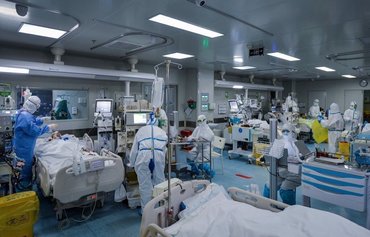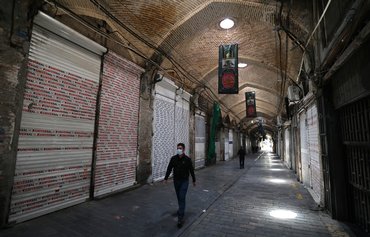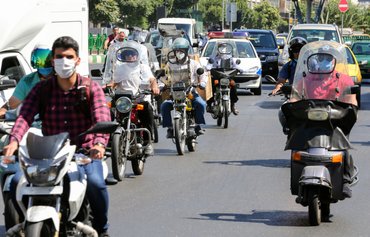On November 21st, Iran's capital Tehran and 150 other cities around the country went into a two-week, extendable lockdown in response to a surge in novel coronavirus (COVID-19) infections, underscoring that the government is still incapable of managing the crisis.
Tehran has rejected US offers of help while consistently lowballing the number of infections in Iran.
"The primary responsibility of the government today is to keep people healthy…therefore, there is no choice but to begin a new round of closures… to control the virus," Iranian president Hassan Rouhani said November 15th.
This marked a complete reversal of his refusal -- a day earlier -- to order immediate closures as his advisers had urged him to do.
The delay in action is taking its toll.
On November 9th, Health Ministry spokeswoman Sima Sadat-Lari said that nearly 693,000 Iranians are infected with COVID-19, and that in the preceding 24 hours alone, more than 10,000 new cases had been recorded.
Distrust in regime on the rise
Tehran City Council chairman Mohsen Hashemi, a prominent moderate-conservative politician and ally of the Iranian president, blasted the Rouhani administration's failure to act in light of coronavirus infections and ensuing deaths.
"It looks like decision-makers do not have the guts or the will to do what is necessary to break the chain" of coronavirus infections, he said in a tweet, echoing the public's frustration.
Rouhani has mentioned on several occasions that his government does not have sufficient funds to help the public in case of a total lockdown, blaming it on US sanctions.
"The Iranian regime does not care about the Iranian people, it is as simple as that," said Farideh Nabovvat, a former school administrator who now lives in the US but has many relatives and friends still living in Iran.
The distrust stems from the Iranian government's refusal to be transparent about its own recent failures. In January, the IRGC accidentally shot down a passenger plane, but Iranian officials denied responsibility for the incident for days.
The tragedy exacerbated an existing deficit of trust between Iranians and their government as the country headed into the worst pandemic the world has seen in a century.
Rouhani, too, acknowledged the "damaging lack of trust in public institutions, the Health Ministry in particular".
The more people come to distrust the government's handling of the COVID-19 pandemic in Iran, the worse off we will be, he said when announcing the latest closures.
The lack of transparency about infection rates has also shaken the public's already precarious trust in government data.
Although the government announces the statistics on new cases of infection and COVID-related deaths every day, most members of the public believe that the numbers are much higher than what is announced, as was the case in August.
IRGC unable to handle virus
In August, an anonymous source inside Iran leaked official data to the BBC, indicating that, at 415,024, the number of COVID-19 infections as of July was nearly twice as high as the official figure released by the Islamic Republic.
At approximately 44,000, the leaked figure on the number of deaths was three times higher than official figures.
Iran's government institutions have done little to demonstrate competency in their handling of the crisis, which has in turn further undermined public confidence. In March, the Islamic Revolutionary Guard Corps (IRGC) announced that it had built a COVID-19 "virus detector".
Iran's Health Ministry and the country's Food and Drug Agency dismissed the news, with Hesameddin Ashena, a top aide to Rouhani, calling it "a propaganda stunt".
Iran's Physics Society -- an independent body of scientists -- called the announcement "as believable as science fiction".
"I do not think the IRGC's goal is to help the Iranian people," said a former Iranian naval analyst who spoke on condition of anonymity.
In May, IRGC Brig. Gen. Ali-Akbar Pourjamshidian said the IRGC has organised "five [COVID-19] testing centres" in Iran.
Pourjamshidian said the IRGC and Iran's conventional army (the Artesh) are "working hand-in-hand to combat" the virus, and that the IRGC Ground Forces' hospital "is being outfitted with 45 ICU beds and can now screen 400 patients at a time".
"The IRGC likes to step into these situations to boost its own image," the former naval analyst said. "They do it for their own benefit. The government does not have enough resources, so the IRGC steps in and imports vaccines, or medication from China, for example."
The IRGC hoards imported vaccines or medicines and sells them on the black market to make a profit. Meanwhile, Iranians are paying hundreds of thousands of rials for masks and other supplies, the analyst told Al-Mashareq.
In September, Iran's Health Minister Saeed Namaki said the Central Bank of Iran (CBI) had yet to provide the Ministry with more than $700 million of the $1 billion that the Rouhani administration had earmarked for combating COVID-19.
CBI governor Abdolnaser Hemmati said at the time that "the government had no choice but to deny some requests, even though they may be legitimate", an indirect admission that the government does not have the financial resources to fight the virus. And yet, hardliners in Iran have rejected help from the international community.

![A hospital in Iran in the early days of a mandated lockdown in November. [Photo via Eghtesad Online]](/cnmi_am/images/2020/12/02/27261-Iran-Covid-lockdown-600_384.jpg)






